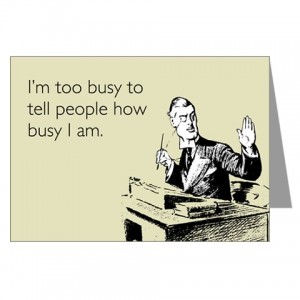 Academics often remind me of the Four Yorkshire Men in the old sketch (not actually originally a Monty Python sketch, but famously performed by them in their live shows – comedy nerd out over, carry on), except rather than trying to outdo each with how deprived we were as kids, we’re always trying to outdo each other with tales of how busy we are. We do it so often that it becomes hard to draw the line between how much this reflects how busy we really are, and how much is just “bragging” to assert how important we are. Somehow, we associate importance/success with being constantly busy, and think that good scientists work stupidly long hours and rarely take a day off. This is so inbuilt into our working culture that we feel guilty when we only work 9-5 or have the occasional lazy afternoon!
Academics often remind me of the Four Yorkshire Men in the old sketch (not actually originally a Monty Python sketch, but famously performed by them in their live shows – comedy nerd out over, carry on), except rather than trying to outdo each with how deprived we were as kids, we’re always trying to outdo each other with tales of how busy we are. We do it so often that it becomes hard to draw the line between how much this reflects how busy we really are, and how much is just “bragging” to assert how important we are. Somehow, we associate importance/success with being constantly busy, and think that good scientists work stupidly long hours and rarely take a day off. This is so inbuilt into our working culture that we feel guilty when we only work 9-5 or have the occasional lazy afternoon!
Worryingly the cult of being busy starts with PhD students. It’s insane the number of times I hear PhD students turning down opportunities (both academic and recreational) because they are “too busy”. Of course there are always going to be periods where you are truly “too busy”. The last few days before you submit a paper, the weeks leading up to a conference, or when you’re in the final stages of writing up. But in general there is nothing in your PhD that is so important that you can’t delay it for a few days/weeks/months. Most times your supervisor won’t mind waiting a few extra days for a draft (they are also busy!), and you can always email journal editors for extensions when writing reviews or returning corrections.
Full disclosure – I was the kind of PhD student that drives me crazy now. I refused to go to seminars unless they were completely related to what I was working on, I rarely read papers for lab meetings, and in my final year I stopped going to morning coffee, ate lunch at my desk and bit the head off anyone who came to my office to chat to my labmates (to be fair this got totally out of control when we got an espresso machine in the office and almost every postdoc in the building came by at least once a day! I’m blaming you Ezard! :P). I regret my tunnel vision now. There were so many things I could have taken time out to learn – things that would have saved me lots of time during my PhD and later in my career. This year I finally taught myself LaTeX for example, which would have saved me months of blood, sweat and tears formatting my thesis. I also wish I’d taken more time to learn to program properly. I’m now working hard to improve my coding, but see that if I’d taken a few months to do this in my PhD, I’d have saved myself a lot of heartache.
I guess my message to PhD students is to try and be less busy, and make more of an effort to enjoy the PhD experience! Easier said than done I know! I am sympathetic – I remember how it felt as a student. I remember feeling terribly inadequate compared to the high achieving PhD students and postdocs around me. I remember the crushing sense of panic and stress as my hand-in date approached and I still hadn’t got past my first chapter. I remember thinking that every hour doing something unrelated to my PhD was an hour wasted. But what I should have known, and what I’ll remind PhD students now, is that your PhD is about so much more than your thesis. Yes, you are judged on your thesis, and you will have to defend it. But you should also be training yourself to become part of the scientific community. Whether you stay in academia or not, it’s pretty unlikely that you’ll ever work on the exact topic of your PhD again. So you’ll need an awareness of other things that are happening in the world of science! You’ll also need to develop other skills, like presentation skills, teaching, and outreach. You can’t do that if you only focus on your PhD topic and nothing else.
But how can we be less busy (and hence less stressed)? This is something I’m constantly trying to deal with myself (if you think you’re busy as a PhD student, don’t ask a Faculty member how busy they are!). A few things I’ve found useful are as follows:
1. Learn to stop when something is “good enough”
Many of the traits that make us good academics, like attention to detail and the desire to do our best at things, can also lead to terribly stressful perfectionism. Instead try to establish when something is “good enough” rather than “perfect”. This is something I’m trying to improve at myself, and I’ll admit that it’s difficult. However, as a PhD student your supervisor should be able to help. Sometimes you can leave stuff like properly formatting references until you’re ready to submit a paper. If you’re really struggling with one section, maybe send the rest to your supervisor for comments, rather than waiting until it’s all perfect (but ask them first).
I find deadlines help me with this – for example, I have a habit of constantly fiddling with lectures so if I have two weeks to make one, it will take me two weeks. However as time goes on, the amount of improvement approaches an asymptote, so two weeks of effort doesn’t create a lecture much better than one that takes me a week. Therefore I give myself strict amounts of time I’m allowed to work on each lecture. After that time passes it’s done. It’s not perfect, but I doubt the students would notice the difference. The same goes for conference presentations and paper drafts.
2. Use “waiting time” efficiently.
PhD students often forget in their rush to finish something and hand it to their supervisor, that their supervisor will take time to return it with comments. If you know this is going to happen you can use that waiting time more wisely. It’s often a good time to format references, add details to manuscript central if you’re submitting a paper, fiddle around with your thesis template etc. Also talk to your supervisor about when they have time to give you comments. There’s no sense in rushing to hand in a draft chapter the day before your supervisor goes on holiday for two weeks leaving you twiddling your thumbs.
3. Schedule time for non-essential reading or for learning skills
As a PhD student I stopped reading widely near the end of my PhD. However, at postdoc interviews I often got asked about what papers I’d read recently that I’d enjoyed. These questions are designed to see how broad your knowledge is, so citing the technical paper you just read on your PhD subject is not going to impress. Additionally, if you want to stay in science (academia or otherwise), you probably should have a basic knowledge of the current controversies in the field. The only way to do this is by reading. However, it’s hard to read non-essential stuff. The easiest way to ensure you do it is by scheduling a bit of time each week (maybe Friday afternoon or Monday morning) to do it. If you choose a time you usually get very little work done it won’t eat into your productivity. I often use this kind of scheduling to learn programming skills or to play with a new R package.
4. Say yes to opportunities!
Of course there’s a limit to how much you can say yes to. But remember that your time as a PhD student is probably one of the most flexible times of your life, especially if you don’t have kids yet. Your schedule is mostly yours to make. So if you can’t get anything to work, spend the day in a local museum and catch up one evening or at the weekend. If you live in a rainy place (cough cough Ireland) and the sun is out, take the afternoon off and go for a bike ride or a walk – you can work a little longer tomorrow when the sun disappears! If you get offered skills training take it, particularly if it’s free and doesn’t require traveling too far. If your friend wants a hand on tropical field work for a couple of weeks, and you have the money, go with them! It’s a great chance to see an exciting country in a whole new light. Go to seminars and conferences. Talk to your colleagues at coffee time. Take a proper lunch break. It’s amazing how much you can get done in short bursts when you need to, especially if you’ve scheduled in proper breaks.
5. But learn to say no to time sucks…
Not everything people ask you to do is going to be useful, and/or fun. If in doubt, speak to your supervisor before saying yes to things (you can then also use the old “my supervisor is an ogre and won’t let me help you, sorry” excuse). For example, organising an event like a conference or an outreach event, is a great thing to have on your CV. But once you have one of these on your CV the gains of organising a second one are low. These things often take up ridiculous amounts of time and energy. The same goes for teaching. It’s great to get teaching experience, but try and get quality experience with different kinds of teaching rather than saying yes to everything. Be strategic in what you spend your time on, based on filling gaps in your CV, and preferably on what you want to do after your PhD.
6. Talk to someone if you need help.
Finally, if you’re really struggling with feeling busy and overwhelmed, talk to someone! Sometimes in academia we have the habit of not talking about problems. This leads us to believe that everyone else is coping, and we’re the only ones struggling. The truth is EVERYONE struggles sometimes. Talk to your friends/PhD colleagues about how you feel – they’ll soon make you feel less alone. Talk to your supervisor, or another faculty member, about ways of coping with stress. And remember most places have a student counseling service if things are too hard to discuss.
Now go forth, be less busy, more happy and more productive as a result!
DISCLAIMER – Your PhD is not all about your thesis. BUT finishing your thesis on time is the most important thing at the end of the day. This post is not about encouraging slacking off, it’s about encouraging efficient working practices. Research has shown that people working 35 hour weeks get as much done as those working 60 hours (long-term, short-term there are gains in working long hours). So use your time wisely, work hard when you have the energy and motivation to do it, and speak to your supervisor if you’re worried about your progress. They are here to help!
Author: Natalie Cooper, @nhcooper123, nhcooper[at]tcd.ie




